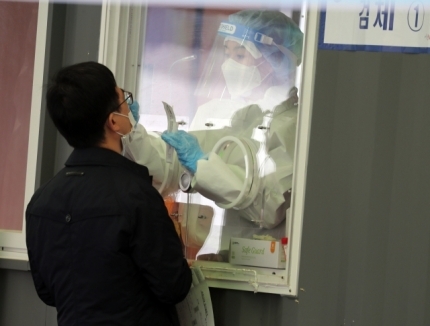 |
A person gets tested at a screening clinic at Seoul Station in Jung-gu, Seoul, Monday. (Yonhap) |
The COVID-19 outbreak is showing signs of worsening ahead of the easing of social distancing next month.
The number of newly confirmed cases stood at 645 as of midnight on Tuesday, up 250 from the previous day. The number is expected to reach 700 on Wednesday. The total number of confirmed cases to date is 152,545.
Health Minister Kwon Deok-chul said at a meeting on Wednesday, “Cluster infections are occurring in places with many risk factors such as schools, academies, workplaces, churches, hospitals, restaurants, karaokes and entertainment facilities.
“In July, when the new social distancing rules take place, various gatherings and activities will gradually increase, contact between people will also increase and the risk of spreading the virus will rise.”
He said the new distancing rules next month will call for higher levels of autonomous prevention and cooperation from all members of society.
“The government will focus on the second-dose vaccinations by the middle of next month and prepare for the second round of vaccinations scheduled for the second half without any disruptions,” Kwon said.
As of Tuesday at midnight, 15.1 million people had received at least one dose of a coronavirus vaccine and 4.29 million had received two doses. They made up 29.4 percent and 8.4 percent of the population, respectively.
Of the newly confirmed cases, 605 were locally transmitted and 40 were imported.
Major clusters consisted of 54 confirmed cases related to a church and family in Yuseong-gu, Daejeon; 10 cases involving acquaintances and family members in Uijeongbu, Gyeonggi Province; and 12 people connected through workplaces or as acquaintances in Gwangju, Gyeonggi Province.
The number of imported cases stood at 40 or more for four consecutive days, for the first time since Jan. 20 last year, when the country’s first COVID-19 case was diagnosed.
Concerns are also growing over the delta variant, considered 1.6 times more contagious than the alpha variant, which is dominant in South Korea. People who get the delta variant are 2.26 times more likely to require hospitalization.
The authorities say the delta variant was the second-most-common kind diagnosed between June 6 and June 12.
The quarantine authorities said, “The best measures are to complete vaccination and comply with personal hygiene rules such as wearing masks and washing hands.” According to US statistics released by authorities, a two-shot vaccination series is 60 percent to 88 percent effective against the delta variant.
Regarding Israel’s recent recommendation to vaccinate people ages 12-15 to prevent the spread of the delta variant, the quarantine authorities said, “We are reviewing the age expansion of the Pfizer vaccine with the Ministry of Food and Drug Safety.”
By Shin Ji-hye (
shinjh@heraldcorp.com)








